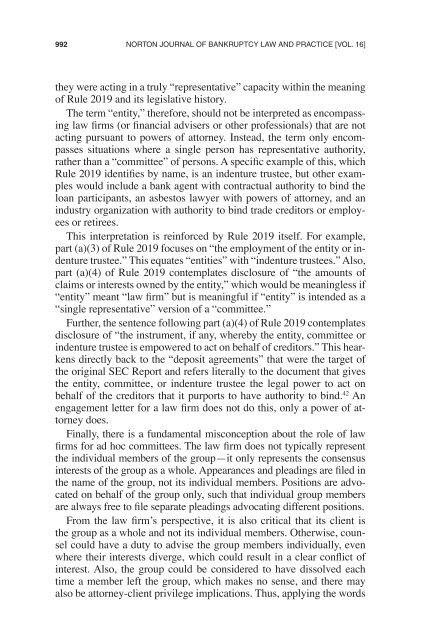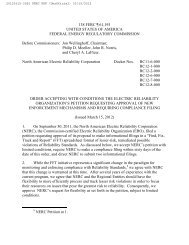Ad Hoc Committees and the Misuse of Bankruptcy Rule 2019
Ad Hoc Committees and the Misuse of Bankruptcy Rule 2019
Ad Hoc Committees and the Misuse of Bankruptcy Rule 2019
You also want an ePaper? Increase the reach of your titles
YUMPU automatically turns print PDFs into web optimized ePapers that Google loves.
992 Norton Journal <strong>of</strong> <strong>Bankruptcy</strong> Law <strong>and</strong> Practice [Vol. 16]<br />
<strong>the</strong>y were acting in a truly “representative” capacity within <strong>the</strong> meaning<br />
<strong>of</strong> <strong>Rule</strong> <strong>2019</strong> <strong>and</strong> its legislative history.<br />
The term “entity,” <strong>the</strong>refore, should not be interpreted as encompassing<br />
law firms (or financial advisers or o<strong>the</strong>r pr<strong>of</strong>essionals) that are not<br />
acting pursuant to powers <strong>of</strong> attorney. Instead, <strong>the</strong> term only encompasses<br />
situations where a single person has representative authority,<br />
ra<strong>the</strong>r than a “committee” <strong>of</strong> persons. A specific example <strong>of</strong> this, which<br />
<strong>Rule</strong> <strong>2019</strong> identifies by name, is an indenture trustee, but o<strong>the</strong>r examples<br />
would include a bank agent with contractual authority to bind <strong>the</strong><br />
loan participants, an asbestos lawyer with powers <strong>of</strong> attorney, <strong>and</strong> an<br />
industry organization with authority to bind trade creditors or employees<br />
or retirees.<br />
This interpretation is reinforced by <strong>Rule</strong> <strong>2019</strong> itself. For example,<br />
part (a)(3) <strong>of</strong> <strong>Rule</strong> <strong>2019</strong> focuses on “<strong>the</strong> employment <strong>of</strong> <strong>the</strong> entity or indenture<br />
trustee.” This equates “entities” with “indenture trustees.” Also,<br />
part (a)(4) <strong>of</strong> <strong>Rule</strong> <strong>2019</strong> contemplates disclosure <strong>of</strong> “<strong>the</strong> amounts <strong>of</strong><br />
claims or interests owned by <strong>the</strong> entity,” which would be meaningless if<br />
“entity” meant “law firm” but is meaningful if “entity” is intended as a<br />
“single representative” version <strong>of</strong> a “committee.”<br />
Fur<strong>the</strong>r, <strong>the</strong> sentence following part (a)(4) <strong>of</strong> <strong>Rule</strong> <strong>2019</strong> contemplates<br />
disclosure <strong>of</strong> “<strong>the</strong> instrument, if any, whereby <strong>the</strong> entity, committee or<br />
indenture trustee is empowered to act on behalf <strong>of</strong> creditors.” This hearkens<br />
directly back to <strong>the</strong> “deposit agreements” that were <strong>the</strong> target <strong>of</strong><br />
<strong>the</strong> original SEC Report <strong>and</strong> refers literally to <strong>the</strong> document that gives<br />
<strong>the</strong> entity, committee, or indenture trustee <strong>the</strong> legal power to act on<br />
behalf <strong>of</strong> <strong>the</strong> creditors that it purports to have authority to bind. 42 An<br />
engagement letter for a law firm does not do this, only a power <strong>of</strong> attorney<br />
does.<br />
Finally, <strong>the</strong>re is a fundamental misconception about <strong>the</strong> role <strong>of</strong> law<br />
firms for ad hoc committees. The law firm does not typically represent<br />
<strong>the</strong> individual members <strong>of</strong> <strong>the</strong> group—it only represents <strong>the</strong> consensus<br />
interests <strong>of</strong> <strong>the</strong> group as a whole. Appearances <strong>and</strong> pleadings are filed in<br />
<strong>the</strong> name <strong>of</strong> <strong>the</strong> group, not its individual members. Positions are advocated<br />
on behalf <strong>of</strong> <strong>the</strong> group only, such that individual group members<br />
are always free to file separate pleadings advocating different positions.<br />
From <strong>the</strong> law firm’s perspective, it is also critical that its client is<br />
<strong>the</strong> group as a whole <strong>and</strong> not its individual members. O<strong>the</strong>rwise, counsel<br />
could have a duty to advise <strong>the</strong> group members individually, even<br />
where <strong>the</strong>ir interests diverge, which could result in a clear conflict <strong>of</strong><br />
interest. Also, <strong>the</strong> group could be considered to have dissolved each<br />
time a member left <strong>the</strong> group, which makes no sense, <strong>and</strong> <strong>the</strong>re may<br />
also be attorney-client privilege implications. Thus, applying <strong>the</strong> words



